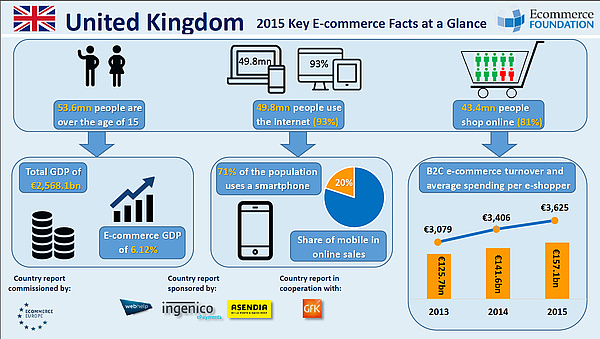
As I was preparing my trip to the Language Show London, I decided to focus my social media coverage on the United Kingdom for a few days and to provide some perspective to entrepreneurs willing to do business with/expand to the UK.
I preferred to choose a different approach than simply collecting data on the internet, and to provide you with an insider’s view by interviewing Claire Johnston, British marketing specialist with an extensive international experience, and Director of BonBon Communications & Events.
Claire and I met at Procter & Gamble in Geneva, Switzerland in 2008, while she was working as a Marketing and Communications Functional Expert. She has a strong international experience (UK, France, Switzerland and Australia) and has worked across various sectors (FMCG, Not for profit, government and SME), which gives her a good understanding of operating cross culturally and, most importantly, to share some useful information and advice about the UK market.
A few facts about the British market
- London is the most important financial marketplace in Europe
- In 2015, the UK was the second exporter/fifth importer in terms of commercial services and the tenth exporter/fifth importer in terms of goods (worldwide)
- The UK is one of the European leaders for e-commerce (including online sales done via mobile devices): +11% in 2015 and +11% also expected in 2016 (source: IMRG). Average annual spend per e-shopper is €3,625 (source Asendia)
- Sectors with a strong potential: Information and Communication Technologies (ICT), biotechnology, aeronautics, defense and renewables energies (source: MOCI)
- Despite the Brexit vote, the economic activity seems to have remained quite stable so far. The GDP growth forecast is +1.8% for 2016 and +1% for 2017 (source: BBC).

Perspectives on the UK market by Claire Johnston
Hello Claire. Can you introduce BonBon Communications & Events to our readers?
- BonBon Communications & Events is a specialist marketing communications & events management consultancy that I established, following many years being based overseas with the aim of supporting businesses to identify and engage with their customers, locally, nationally and internationally – we offer 4 core areas of support, covering: marketing communications/brand & PR, social media strategy, events & exhibition management and internal communications/employee engagement.
- We have worked with clients of varying sizes from start-ups, helping them to build a brand profile, mid-large organisation’s that cover international markets and a global workforce and also those based overseas, helping to introduce new brands into the UK market.
How would you say Brits perceive French and Swiss entrepreneurs and products?
- Brits love all things French and depending on industry/product type I would say that style, passion and good taste, would be the assumed perception over reliability and trust.
- The Swiss however are known for high quality and reliability, therefore trust.
- In either case, I would pay a higher price point for a product based on these perceptions and believe many consumers across the UK would too.
Can you share some basics about the British business etiquette?
- Yes of course, Brits are by nature, quite reserved, over polite, apologize frequently (“I’m sorry but would you mind closing the window”) and over explain themselves.
- However generally in business, Brits are honest, to the point and can be trusted to have high levels of integrity, with a ‘have a go’ attitude to get things done, even if it means skipping lunch, existing on copious amounts of milky black tea (which is lost on the French).
What are the must-know in terms of communication in the UK?
- British communication style is a mix of direct/indirect which can be confusing x-culturally, the best thing to remember is KISS – Keep It Simple Stupid. i.e. keep written work and presentation material short, concise and to the point, particularly when presenting data but also to avoid the key messages getting lost.
- Don’t be afraid to inject a little humor, as this is often appreciated by the British, however be careful to ensure that you understand the meaning of any attempt, to avoid embarrasment.
Would you say that good written communication is important to do business in the UK? Why?
- Yes, absolutely, it’s vitally important that any companies that are looking to start doing business in the UK, thoroughly research their market/target audience to ensure that their marketing messages don’t get lost in translation – what’s relevant in one market, might not be in another.
- Therefore it may be necessary to adapt and take a different approach to ensure success.
Has any success story been inspiring you?
- I am constantly amazed at how many entrepreneurs are out there, every day developing their ideas into a business or new brand and quite often not getting the publicity they deserve.
- One story that really inspires me, is the growth of Micro-scooter’s in the UK. 10 years ago, anyone that had spent time in Switzerland would know this brand as most children, even tiny kids could be seen on the sturdy 3 wheeled frame, my own daughter had one aged 3 and I constantly used to go on about how innovative and unique these products were, in comparison to those seen in the UK. As it was, around the same time, a mum in Clapham, London, happened to have the same feeling and decided that the UK should have these products, so her and a friend contacted the head office in Switzerland and became UK distributors (with very little experience) 10 years on, with the company using a mum ambassador strategy, which clearly works, these scooters can be seen virtually everywhere and the company is a super success story with over 1 million sold in the UK to date.
Would you have some advice for entrepreneurs willing to expand to/reach the UK market?
- The most important thing is to thoroughly research your market and the competition, why would your product work, is there a gap?
- Then research your target demographic, spend time on the ground and consider using a local partner who understands the UK market to act as an advocate for the brand and develop the messaging you need on a local level.
- Exhibitions are a fantastic way to meet buyers F2F and also key trade publications, so consider attending relevant shows, both as a form of research, but also as an exhibitor.
Who should foreign businesses turn to when first approaching the UK market?
- The UK government has a UK Trade & Investment department that can help support businesses that are looking to start doing business in the UK. I worked for this department when based in Australia, it does come with a cost, but could be a great way to research the opportunities.
- My own business has also been established to help support new businesses on a local level and I have recently been working with some overseas companies not yet seen in the UK, developing brand strategy and distribution opportunities here in the UK. www.bonboncommunications.com
Doing business in the UK: Additional useful websites
- World Bank Group – Doing Business UK
- The Hufftington Post – Cross-cultural Business Etiquette
- Brian Cave – Doing Business UK Report